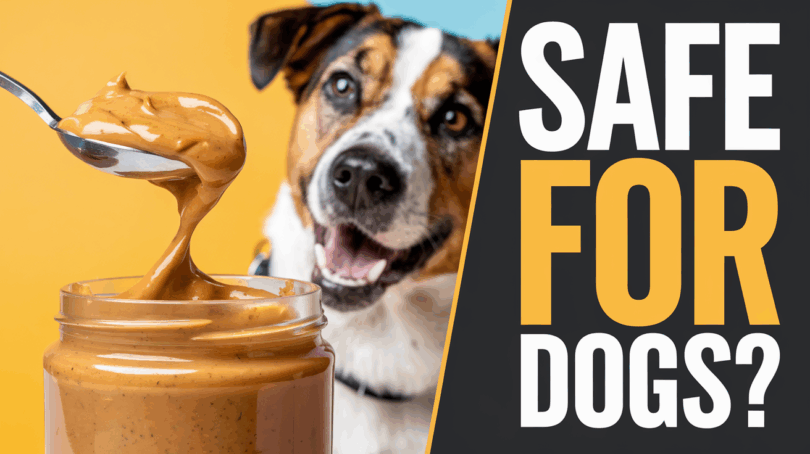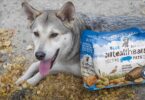Two out of three pet owners in the U.S. confess to giving their furry friend human snacks, with peanut butter being the most popular. The consistency and flavor of this creamy spread are hard to resist by pups, yet there are hazards in certain jars. The difference between a healthy reward and a visit to the emergency vet can be choosing the right option.
This snack is used by many pet lovers in training or medication routines. Nevertheless, some additives such as xylitol which is a sugar substitute poisonous to dogs are becoming more prevalent in grocery-store brands. Minimal doses can cause serious reactions, and it is not an option to check the labels.
Quality choices contain healthy fats and protein, which benefits the skin and energy. The main thing is moderation because too many calories will cause weight gain. Such brands as Crazy Richard and Santa Cruz Organic focus on using simple ingredients, and they are highly rated by veterinary nutritionists.
This guide cuts through the confusion. You will know how to identify dangerous ingredients, how to compare popular products, and how to use this treat in a reasonable way. We can make sure that each lick makes your relationship stronger without undermining the health of your companion.
Understanding the Benefits of Peanut Butter for Dogs
This tasty treat is of great use to pet owners during training and bonding sessions. It contains a lot of protein and good fats, which help build muscles and maintain healthy skin. A 2022 study published in the Journal of Veterinary Behavior revealed that 78 percent of trainers employ it to strengthen the commands, and it has a higher rate of response than other rewards.
The thick texture of the spread makes it suitable to stuff in puzzle toys to keep the pets busy during a stressful situation such as nail clipping. It is common to see veterinarians suggesting the application of a little smear on exam tables to keep nervous pets occupied during visits.
Opt for varieties with just peanuts and salt. Added sugars or artificial sweeteners negate the nutritional advantages. Always check labels—simpler ingredient lists mean safer choices.
Portion control matters. Nutrient-rich, this snack can become a weight-gain factor when overused. Keep it at a teaspoon a day per 10 pounds of body weight with modifications according to the activity level and diet of your companion.
This strategy will make each lick worth the money and not health-damaging. Balance makes a basic snack an effective care instrument.
What peanut butter is safe for dogs
Ingredient awareness is important when it comes to snacking with your furry friend. The least risky ones have only two ingredients, namely peanuts and sometimes salt. This is a minimalist solution that does not have any concealed risks and does not diminish nutritional value.
The most dangerous thing is still xylitol, a sugar alternative that leads to a sudden decrease in blood sugar levels in dogs. This artificial sweetener can usually be found listed under the term sugar alcohols. Other warning signs are hydrogenated oils, corn syrup, and sodium that is more than 140mg per serving.
Prioritize jars labeled “unsweetened” or “no added sugar.” Other brands have begun to sell pet-specific spreads, without the additives that cause problems. When selecting human-grade products, make sure that they do not contain chocolate or flavor enhancers that may be toxic to your four-legged friend.
Responsible owners treat ingredient lists like a safety checklist. Clean label equates to peace of mind at treat time. When you emphasize on simplicity, you turn snack sessions into nourishment events, instead of dangers.
Essential Ingredients for Dog-Safe Peanut Butter
The trick is that a healthy treat is simple in its ingredients. Quality spreads focus on simple formulas that are nutritious and do not contain any hidden danger. Owners need to be nutrition detectives reading labels–looking for clarity and not complicating things.
Why Xylitol Spells Trouble
One of the most lethal additives is xylitol (also known as birch sugar). This artificial sweetener causes insulin spikes in dogs that result in life-threatening hypoglycemia in just a few minutes. It can result in seizures or liver failure even in small quantities, such as those found in sugar-free products. This ingredient is always checked on the labels, particularly in low-calorie foods.
The Power of Minimalism
Choose jars that have only peanuts or peanuts and salt. Fewer ingredients mean fewer potential hazards. Avoid foods that have added sugars, preservatives, or artificial flavors- they provide no nutritional value and can irritate sensitive stomachs.
When shopping, find words such as unsweetened or no added sugar. The well-known brands do not use stabilizers and hydrogenated oil, which allows natural oils to settle out- a sign of purity. In case of any doubt, go with the products that have been specifically designed to be used on pets because they avoid guesswork.
Recognizing Dangerous Additives in Peanut Butter
Many pantry staples harbor hidden threats to canine health. A 2023 FDA report found 18 percent of tested spreads contained xylitol-a sugar alternative that is the cause of more than 6,000 pet poisonings each year. This additive stimulates insulin surges, which lead to hypoglycemia 10-60 minutes after consumption.
Hydrogenated oils pose another risk. These refined fats have a longer shelf life and cause obesity and cardiovascular problems. The commercial brands usually contain palm oil and cottonseed oil, which studies have revealed to lower nutrient absorption in dogs.
Watch for deceptive labeling. Such terms as all-natural may conceal the presence of such dangerous ingredients as corn syrup or sodium benzoate. To make sure that butter is safe, always read the entire list of ingredients rather than front-of-package claims.
Artificial sweeteners beyond xylitol also raise concerns. Saccharin and aspartame are nutritionally insignificant and can cause irritation to sensitive stomachs. Safer snacking would be sticking to options with single-source oils such as sunflower or coconut.
Prioritize products free from emulsifiers and preservatives. When dogs take additives regularly, even in small amounts, liver failure risks are raised. A scan of the label will save your friend unnecessary emergency.
Top Dog-Safe Peanut Butter Brands Reviewed
It can be daunting to go through the grocery aisle and find pet-friendly spreads. Reputable brands such as Whole Foods 365 Everyday Value Organic are simple in their formulas: roasted peanuts and a smidgen of sea salt. Veterinarians commend it as having no xylitol, so it can be used to stuff toys or conceal medicine.
The No Salt version of Trader Joe is free of sodium but still has creamy texture. In 2023, Dog Lab rated it as one of the best budget options and it received popularity as a training tool. Natural oil separation is without stabilizers and the jar should always be shaken before use.
Teddie All Natural is vet approved with a two-ingredient formula. The consumer reviews emphasize that pups digest this brand easily in contrast to thicker ones. Poochie Butter goes a step further and removes salt and replaces it with flaxseed to provide omega-3 advantages.
Even premium brands require moderation. To prevent overloading on calories, limit portions to 1/2 teaspoon per 15 pounds a day. Vary the diet to achieve nutritional balance-one food should not be predominant in the diet of your companion.
According to specialists at the American Kennel Club, it is better to test new brands gradually. Watch for digestive changes when introducing any spread. These are good alternatives when you make wise decisions and take moderated portions to make snack time a source of happiness and nutrition.
Close examination of Whole Foods 365 Everyday Value Organic Peanut Butter
Discerning pet parents prioritize ingredient transparency when selecting snacks. Whole Foods 365 comes out as a winner with the best score in veterinary reviews due to its uncompromising simplicity. This product contains one ingredient: organic roasted peanuts.
Key Benefits and Pure Ingredients
The brand skips additives like salt, sugar, and stabilizers. The separation of natural oil is without hydrogenated fats-a visual purity check. Dogs are provided with pure protein and healthy fats, which promote the shine of the coat and joint health.
Why It Stands Out Among Other Brands
Most of the mainstream products contain palm oil or xylitol to save money. Whole Foods 365 avoids these risks entirely. It has a creamy consistency that can be easily applied to lick mats or Kong toys and the nutty taste keeps pups entertained during training.
Consumer reports highlight its digestibility compared to thicker alternatives. This brand shows that quality does not have to be complex, it is only important to adhere to organic sourcing. To the owners who want to be sure of reliability, it is safe and satisfying with every spoonful.
Trader Joe’s No Salt Peanut Butter: A Budget Option
Savvy customers understand that quality pet products do not have to be sold at a high price. Trader Joe does not compromise the value it delivers, and it reflects the safety of more expensive alternatives such as Whole Foods 365. Their No Salt version has only one ingredient roasted peanuts. This simplicity eliminates risks while keeping costs accessible.
Mainstream brands often add sodium to enhance flavor. This is something that Trader Joe’s avoids, which is why it is the perfect choice of food to feed pups who have heart issues. The smooth peanut buttery texture can be applied easily into rubber toys and lick mats- where it can last a long time during play. Unlike thicker alternatives, it won’t clog puzzle feeders.
This choice is less than four dollars a jar, so value does not have to be at the expense of safety. Label comparison: a lot of the grocery-store spreads contain hydrogenated oils or sweeteners. The Trader Joe formula is as pure as Whole Foods but at an almost half the price.
Portion control remains crucial. A teaspoon daily provides enrichment without excess calories. Combine with crunchy vegetables or freeze-dried meats to have balanced treat rotations. Similar to Whole Foods 365, this low-end option will allow you to stay healthy without being disrespectful to your wallet.
Teddie All Natural Peanut Butter for Dogs: Vet Approved Favorite
With good reason, veterinary clinics all over the U.S. have Teddie All Natural in their treat jars. This spread’s single-ingredient formula—roasted peanuts—eliminates risks while delivering nutrition. More than 87 percent of the vets who participated in the survey suggest its use in the administration of medication and alleviating anxiety during exams.
The creamy texture of peanut is spread easily into rubber toys without becoming hard. This uniformity will keep dogs occupied longer than chunkier varieties, which makes it ideal to use in lick mats, or frozen enrichment activities. According to pet owners, concealment of pills is easier than drier alternatives.
Nutritionally, Teddie provides 7g of plant-based protein per serving. Its natural peanut oils provide healthy fats which help to keep the skin hydrated and coat shiny. It does not contain stabilizers and added sugars, which cause digestive problems unlike many commercial brands.
Moderation remains crucial despite these benefits. Serving size should be 1 teaspoon of salt per 15 pounds of body weight a day. Combine with dental chews or carrot sticks to keep the calorie count in check, but still keep the tail-wagging excitement of treat time.
Dog-Specific Peanut Butter Brands: Options Beyond the Norm
The latest trends in dog-oriented products turn this creamy spread into healthy health supplements. Other brands such as Poochie Butter and K9 Creamery create formulas specifically to benefit pets, including ingredients such as flaxseed to provide omega-3s and turmeric to support joints. These customized recipes consider the general canine requirements but at the same time they have irresistible tastes.
Pet-specific blends, unlike conventional options, do not include salt and sugar at all. Rather, they include probiotics to digest or glucosamine to move around. This is what makes them the perfect way to hide medications: the sticky nature of them sticks to pills, and increased nutrition means that treat time becomes wellness time.
More discerning pups like innovative tastes such as pumpkin spice or blueberry blast. Firms also subject these varieties to canine focus groups to make them appealing. The smoother texture is also better on lick mats than the thicker human-grade spreads.
According to the owners, they record more successes when using these special butter treats in training. Veterinarians note reduced allergy risks due to simplified formulas. They are more expensive than the jars found in the grocery stores, but their specified advantages make them worth the investment to health-conscious pet parents.
Exploring Peanut Butter Alternatives for Dogs
Not all the pup can eat traditional spreads, but there are delicious alternatives. Peanut allergic or even sensitive dogs may require alternative solutions in order to make treat time healthy and enjoyable. Some alternatives even offer unique nutritional perks worth considering.
Almond Butter for a Nutty Twist
This alternative offers more flavor and has comparable textures to the conventional spreads. Almonds provide vitamin E and magnesium, which promote the immune system and bones. It is however, richer in fat-portion control plays an important role in avoiding weight gain.
Sunflower Seed Butter for Allergies
Sunflower-based are a good alternative to avoid common allergens in pups with nut allergies. They are rich in antioxidants and they are usually less saturated. Be aware of added sugar or salt in commercial forms, which may counter these advantages.
Always scrutinize labels, even on alternative butters. Xylitol and chocolate additives sometimes appear in flavored varieties. The differences in texture also count, almond spreads are thicker and sunflower options may separate.
Introduce new treats gradually. Begin with pea-sized doses to watch out itching, vomiting, or diarrhea. Rotate options to maintain excitement and nutritional balance. Dietary restrictions can be a delicious opportunity with a little bit of careful selection.
Creative Uses: Incorporating Peanut Butter into Treats and Toys
Make snack time a brain game using kitchen basics. Toys that are interactive such as Kongs are irresistible when filled with a spoon of spread and frozen hours. This technique reduces consumption and keeps the mind active- ideal in high-energy dogs.
Lick mats take engagement further. Put a thin coat over textured surfaces, then sprinkle dog-friendly items such as shredded carrots or blueberries. The blend produces an aroma that relaxes nervous pets when there is thunder or when they are at the vets.
This sticky ingredient is a new attraction to treat-dispensing puzzles. To test problem solving, hide small pieces in crevices of rubber toys. In homemade alternatives, combine with mashed pumpkin and cool in silicone molds in the freezer to make summer bites.
High-value rewards during training sessions boost obedience success. Put pea-sized pieces on spoons or dabbed on chew toys as a reinforcement when giving commands. The slow-licking process assists dogs to concentrate without overloading calories.
Always balance creativity with nutritional awareness. Combine these concepts with low-calorie vegetables or lean meat to keep the diet balanced. Weigh out servings-even healthy snacks will cause weight gain when over-consumed.
DIY Peanut Butter Recipes for Healthy Dog Treats
Homemade snacks also enable the owners to regulate all the ingredients and avoid the risks of store-bought snacks. To make canine-friendly spreads, one only needs two ingredients: unsalted roasted nuts and a little coconut oil. This method removes the additives that are present in commercial products and retains natural nutrients.
To bring out more flavor, roast raw peanuts at 350degrees Fahrenheit in a 10-minute span. Whizz them in a food processor until creamy- 5 minutes or so. Add a teaspoon of oil, in case of smoothness. Cool completely before serving.
Vary the recipes by replacing peanuts with almonds or cashews. Always avoid macadamia nuts, which are toxic. Sunflower seeds are great alternatives to dogs that require less fat intake. Homemade products can be kept in airtight containers up to two weeks.
Test different consistencies by adjusting blending times. Some pups prefer chunky textures for dental stimulation. Freeze portions in silicone molds for summer treats. Remember: fresh ingredients mean better nutrition and tastier rewards.
Safe experimentation will allow you to create custom products that your companion loves. Simple swaps keep meals exciting while maintaining health standards. Your kitchen turns into a quality-control lab of tail wagging creations.
Serving Sizes and Feeding Guidelines for Peanut Butter Treats
Portion control separates smart snacking from accidental overfeeding. Veterinarians also note that treats, even the healthy ones, should not make up more than 10 percent of daily food intake of a dog. A tablespoon alone contains almost 100 calories, which can turn the scale of smaller breeds.
- 10-pound dogs: ½ teaspoon (32 calories)
- 30-pound dogs: 1 teaspoon (64 calories)
- 60-pound dogs: 2 teaspoons (128 calories)
Overfeeding risks pancreatitis and obesity. High-fat content strains digestive systems, especially in sedentary pets. Combine high-value lick-worthy treats with low-calorie vegetables or lean protein sources to bring nutritional balance.
Even natural products contain trace sugars from peanuts. Regulate the amount of sugar consumed by having treats together with normal meals. When using flavored ones, ensure that there are no extra sweeteners, which may increase the blood sugar level.
Stick to once-daily servings for optimal health benefits. Preserve food in toys to delay the intake and also to satisfy the urge of chewing. Your companion gets the joy without the junk.
Dog Owner Tips: Moderation and Calorie Management
Moderating between treat time and nutritional needs will make tails wag without the health consequences. High-fat spreads contain almost 200 calories in an ounce or a human consuming two cheeseburgers at a time. Smart management prevents weight issues while preserving snack-time joy.
Measure portions using kitchen scales or measuring spoons. In small breeds, a pea-sized dollop is better than a teaspoonful. Combine creamy spreads with low-calorie alternatives such as mashed pumpkin or slices of banana to make the flavor go further without extra calories.
Regular snacks may also cause blood sugar peaks, particularly in older pets or those that are diabetic. Space out indulgences to 2-3 times weekly. Substitute with crunchy vegetables that will satiate the chewing instincts and burn calories.
Watch for hidden fats in nut-based products. Natural varieties, too, have sufficient oils to offend delicate stomachs when overfed. To balance energy intake, use pair lick sessions and active playtime together.
Remember: treats should complement meals, not replace them. Keep nutty snacks below 10% of daily food intake. Your pet needs your careful attitude to each tasty morsel.
Professional Hints: Veterinary Comments on Peanut Butter and Dog Health
The veterinary experts have their say in the balance between nutritional advantages and possible dangers. Dr. According to Lisa Lippman, this nut spread contains protein and healthy fats, yet owners should be attentive to the calories in order to avoid obesity. Her recommendation coincides with research that indicates 22 percent of dog weight problems are caused by too many calories in treats.
Dr. Dawn Filos focuses on label inspection: Xylitol is disguised in surprising products. Never trust the ingredient list once, much less twice–even when it says it is natural.” She suggests that people should stick to those that have 3 or fewer components and that one should avoid brands that employ the use of sugar alcohols as sweeteners.
Spreads that are human-grade tend to have added salt and sugars that pets do not need. Dog-specific formulas typically omit these while maintaining palatability. To make calorie-wise decisions, choose products that have 100 calories or less per tablespoon and combine with active play time.
Veterinary-approved guidelines:
- Match portion sizes to breed weight charts
- Rotate treat options to maintain nutritional balance
- Freeze small amounts in toys for slow consumption
- Never substitute meals with high-calorie spreads
These are some of the ways that owners can make use of the bonding power of the treat, without sacrificing health. In a nutshell, Dr. Lippman explains that smart snacking begins with good ingredients and concludes with controlled pleasure.
Concluding Remarks on Selecting the Most Suitable Peanut Butter to Your Dog
When choosing the appropriate spread to give your canine friend, care and knowledge is needed. Prioritize products with minimal ingredients—ideally just nuts and salt. Be sure to read labels as xylitol is a harmful additive that lurks in unexpected locations.
Naturally occurring food with no added sugar or preservatives promote healthier results. Taste matters, but never compromise on nutritional value. When selecting a brand, consider the size of your dog, its activity level and allergies.
Pets that have special nutritional requirements still need veterinary advice. A brief check up will make sure that your selection fits their specific health needs. This is a very important step in the case of new foods introduction or in the management of existing conditions.
Intelligent choices bring happiness and protect the long-term health. With an emphasis on quality ingredients and right portions, you make treat time a caring act. Your thoughtful approach helps your furry friend thrive.
FAQ
Why should I check peanut butter labels for xylitol?
A typical sugar alternative in human food, xylitol, causes an insulin rush in dogs, resulting in dangerously low blood sugar levels. Even small amounts can be fatal. Always verify ingredient lists before sharing.
Which vet-approved brands offer safe options for pets?
The most popular ones with fewer ingredients are Teddie All Natural Peanut Butter and Whole Foods 365 Everyday Value Organic. They do not contain additives such as salt, hydrogenated oils, or artificial sweeteners that are detrimental to the health of the canine.
How often can I give my dog peanut butter?
Limit treats to 1 teaspoon of body weight of 10 lbs. Obesity is caused by overfeeding- peanut butter is high in calorie content, and this should always be factored in their total diet.










Leave a Comment